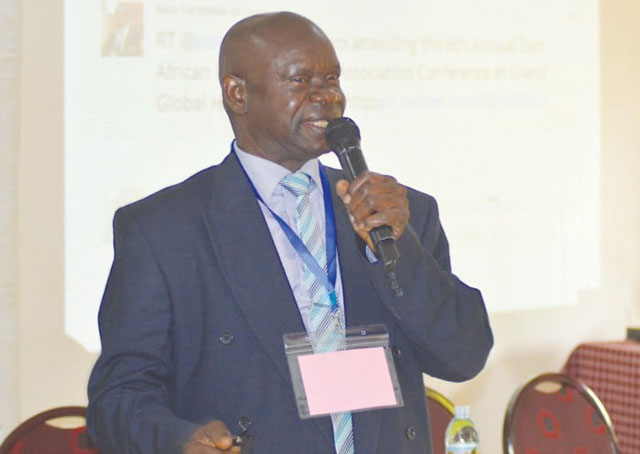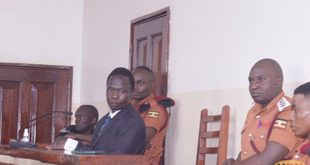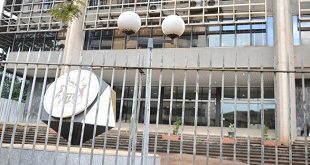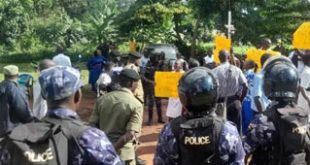
He was a man of great experience with a leadership track record in the civil service. He also had extensive international exposure.
EULOGY | By Monica B. Chibita | This morning I woke up to the shocking news that my friend and colleague, Mr. Okoku Obomba had passed away at Mengo hospital.
I know Mr. Obomba had some health issues, but I had spoken to him this past week, and he had assured me that the situation was under control and that he was on his way to attend a physiotherapy session.
In fact he told me that he had taught a class that week which further re-assured me that he was on the road to recovery. I encouraged him to seek proper medical care to ensure everything was right before he took on a heavy workload again.
Because I lived in Kira and he in Namugongo, we occasionally rode home together from work, so I got to know Mr. Obomba quite well. I liked to run important decisions by him because he was extremely mature and objective.
We also laughed a lot together, but in spite of this, I never got comfortable calling him Remegious (his first name). He was so polished and professional in his appearance and conduct, it felt disrespectful not to call him “Mr. Obomba.”
Mr. Obomba was one of the pioneer staff of the Mass Communication Department. He was instrumental in the writing of the maiden curriculum on which the Bachelor of Arts in Mass Communication was built. He has since taught a range of courses including Introduction to Mass Communication, Media Theory, Broadcast News Reporting and Current Affairs, and most recently, Media Literacy. He loved teaching and built strong bonds with his students.
For many years we were hesitant to replace him as internship co-ordinator because he offered vital leadership to that exercise, and was well known to the industry. He took his work very seriously. He also willingly stood in as Head or, later, as Dean whenever asked to.
Mr. Obomba was a man of taste, and whether he wore an African shirt (which he often did) or a suit and tie, he always appeared extremely well-groomed. His students loved to make fun of his suspenders, which he sported once in a while, as well as his high-waist trousers. Mr. Obomba also loved to walk, so most people at the Main Campus had bumped into him at least once.
Mr. Obomba was gentle but firm—the quintessential gentleman. In our staff meetings, he listened to all views but he was clear where he stood on issues, and he expressed this emphatically, yet with grace. He was not afraid to be in the minority but he was never obnoxious in his disagreement.
Mr. Obomba was also humorous and loved a good laugh. He did not use his first name (Remegious) very often, so some of the newer members of staff did not know it. However, in 2019, we had a Faculty retreat at the Centre for Work, Culture and Ethics in Semuto facilitated by Sam and Nora Bwaya.
During one of our activities, we were each asked to provide a name by which we wanted to be known during the retreat. To everyone’s amazement, Mr. Obomba said “Remmy.” I still remember the raucous laughter that drew from all of us. Remmy? This seemed inconsistent with the serious, slightly conservative image he cut. From that point on, colleagues referred to him as Remmy (in his absence).
Being a retired civil servant, Mr. Obomba was quite well travelled. However, he still had not come to a level of full comfort working with computers! So, if he had to deliver an important report, it would arrive very well written and formatted, in cursive.
His many years in journalism also seem not to have translated into a respect for deadlines. He had his own sense of when things were due. Given that most of his work came hand-written, that meant one needed to create time to have it typed as well.
Mr. Obomba was one of the more senior members of staff, so he was treated with a degree of affection and reverence, and people were always willing to step in and support him where necessary. The most recent such intervention came during the grading of the just concluded examinations.
Mr. Obomba gently indicated during one of our phone conversations that he could not sit for very long because he had pain in the back. When I shared this with colleagues, several of them volunteered to support him with his grading, and the results were all delivered on time.
Mr. Obomba was one of a dying breed of journalists and had difficulty understanding the thing broadcast journalism today has become.
He was a man of great experience with a leadership track record in the civil service. He also had extensive international exposure. This notwithstanding, he never demanded to be recognized or respected, and he did a lot of what he did quietly. This humility is a quality we will all miss.
Fair thee well Remmy. You fought a good fight. We loved you and we will miss you.
*****
✳ Monica B. Chibita is Dean, Faculty of Journalism, Media and Communication
UCU
✳ Adapted from UCU Facebook
 The Independent Uganda: You get the Truth we Pay the Price
The Independent Uganda: You get the Truth we Pay the Price


